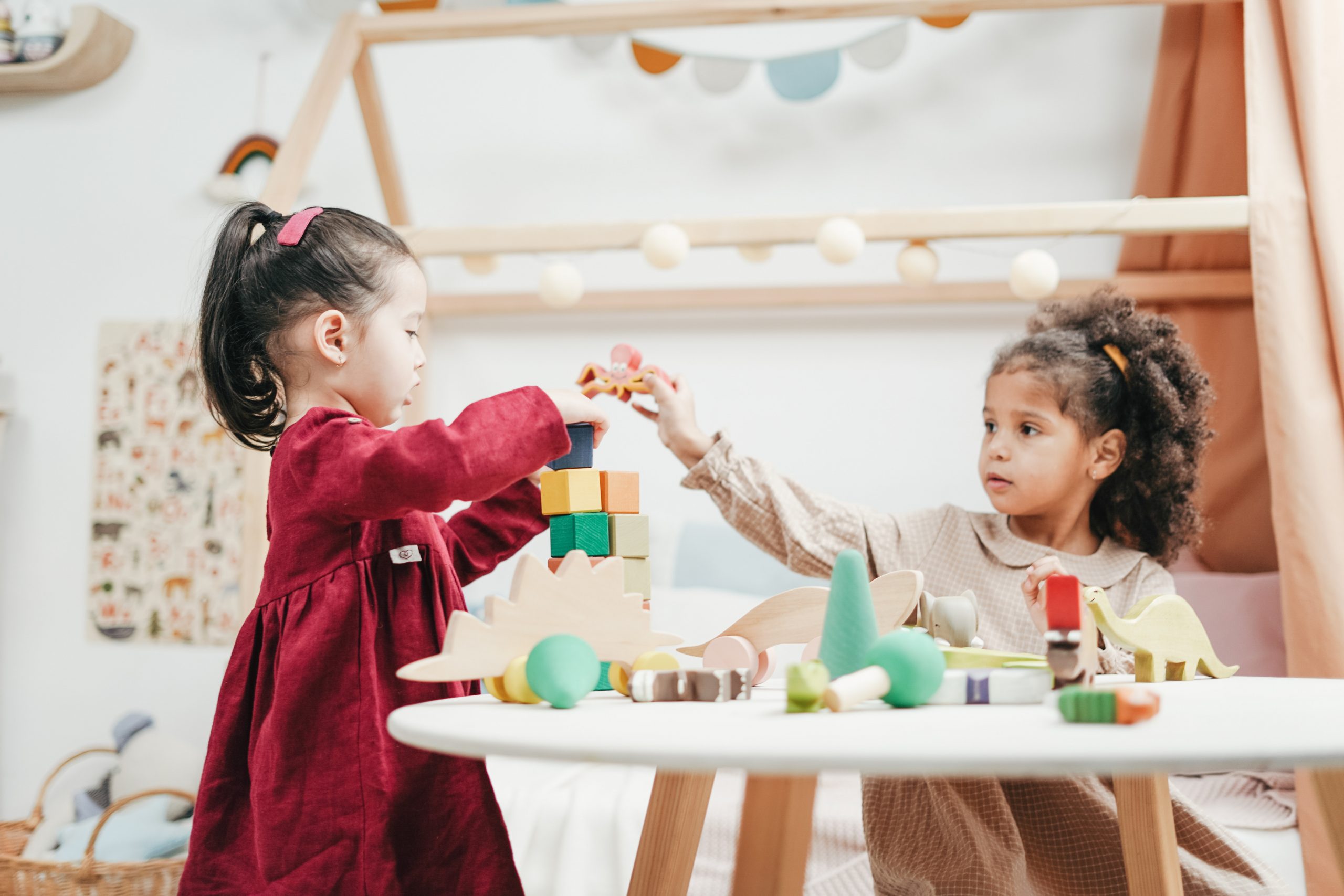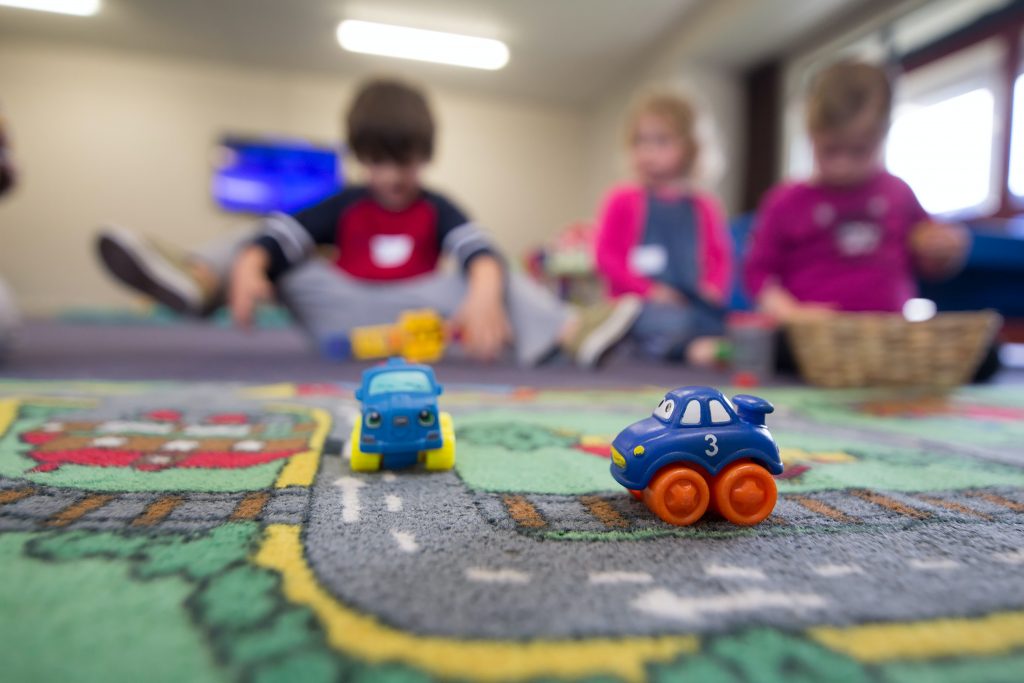Most parents need to have their children in daycare because they need both parents to work in order to make ends meet. Some people, however, have made the decision to provide for their families in a way that allows them to work outside the home as well. Rarely does a single parent manage to raise a child and keep a job at the same time.
Many parents worry because they feel they can't handle everything, but they can rest easy knowing that daycare is an alternative. Long-term academic, economic, and social benefits accrue to both children and their families. Daycare settings, with their emphasis on quality teaching, structure, and social lessons, are beneficial for children of all ages, including infants and toddlers as young as six months old and as old as four years.
Whether and when to enrol your child in daycare is a very personal decision that can be influenced by a variety of circumstances, such as the length of your parental leave, the ability of your partner to take leave, your financial responsibilities, and the availability of other childcare options, such as relatives or in-home care.
But it is generally agreed that the longer you can wait, the better. A stable attachment can be formed, the umbilical cord can heal completely, a routine can be established for feeding and sleeping, and everyone can get used to the many changes that come with a new baby.
Waiting till the baby is older isn't always an option because many working parents only have six weeks leave and their family rely on the income. Many childcare centres do not have the resources to care for newborns who are premature or have other medical needs, thus many do not accept children younger than six weeks old.
It doesn't matter how much you adore your job or the daycare centre, it's never easy to leave your child behind every morning. But don't worry, mothers; numerous studies show that investing in high-quality childcare, where carers have frequent positive interactions with children, which typically correlates with low teacher-to-student ratios and teachers with higher levels of education, pays off in a variety of important ways, even into adulthood. Find evidence? The next time someone tries to make you feel bad about working, remember these unexpected benefits of sending your kids to daycare. They're all supported by scientific study.
Are you in need of some playthings for the baby's room? No need to keep looking. What you need is in My Baby Nursery.
When Should You Begin Your Search for a Daycare?
Finding a reliable daycare is a task begun while pregnant. There is always a waiting list for the best daycare facilities. Early daycare research is essential if you anticipate needing to return to work within a relatively short time frame. By doing so, you can address any concerns regarding childcare well in advance of having an infant, recovering from childbirth, and experiencing the mixed feelings associated with returning to work.

Choosing the Right Daycare Center
Be sure to enquire extensively about the daycare's licencing status, staff credentials, infant-to-caregiver ratio, and daily schedule. When infants first begin to explore their surroundings, it's important that they do so in an area that is both clean and secure.
Family daycare can be perfect for infants because they get lots of one-on-one attention from one carer, which is crucial during this developmental stage. Since there are only a few infants in the care of each adult, everyone's needs may be met promptly.
The Child Development Council suggests a maximum of eight infants per carer, and a ratio of one adult to four infants between the ages of 0 and 18 months. (This is applicable in any environment, whether at home or elsewhere.)
Babies under 18 months of age benefit greatly from developing a secure relationship and trust in their carers. Maintaining a steady flow of care is crucial at this time. For a baby to get attached to and trust their carer, it takes time.
When infants are given lots of love and affection from their carers and are encouraged to play and engage with them, as well as exposed to a wide variety of languages, they can flourish in a childcare setting. A good babysitter will know how babies grow and develop, be comfortable showing affection, and be sensitive to the requirements of infants.
As long as a baby is getting loving care at home, a 2006 study by the National Institute of Child Health and Human Development found that childcare poses no threat to the mother-infant attachment.
Other Childcare Options
Hiring a nanny or other professional caretaker is another option to daycare until your child is old enough for you to return to work. Think about the things that are essential to you in a childcare setting, such as price, availability, the amount of individual attention your kid receives, and anything else.
FAQS About Daycare
Although infants can start daycare at 6 weeks, many experts agree that the longer you can wait, the better. This allows time for the establishment of a secure attachment with your child, complete healing of the umbilical cord, figuring out feeding and sleep patterns, and adjusting to a new life together.
Some babies end up sleeping better at day care than at home, usually due to the extremely consistent schedules and routines in place at child care centers. But other babies may sleep significantly worse at day care than at home, typically due to the differences in environment.
Based on these findings it is clear that children enrolled in care for at least two to three days per week experience greater long term benefits, including an easier transition to school and increased social growth.
Specifically, children in center-based child care from 6 months of age and older showed improved cognitive and language development at age 3, enhanced academic skills at age 4 ½ , and fewer behavioral problems at age 2 and 3 than children who were not in center-based care.
Take your baby to the daycare before school starts and visit for a while. Let the daycare teachers hold them so that they can get to know them. Let them play with toys that they find exciting at the center. Tour the campus and let them play on the playground.
The Value of Daycare for Young Children
Consistent Schedules and Routines
Even infants and toddlers follow a routine in daycare. The youngsters are supplied with a comprehensive schedule of activities, including songs and stories, so they won't even notice the passing of time. This kind of play is crucial to a child's cognitive development at the toddler age. Parents can take comfort in the planned activities because they won't have to worry as much that their toddler's behaviour will be irregular at the end of the day owing to a lack of set periods for eating, playing, and napping.
Academic Advancement
According to a major study conducted by the National Institutes of Health in the United States, kids who attended good daycare as toddlers and preschoolers tended to do better in school as teenagers. Over 90% of the more than 1,300 youngsters surveyed had lived in non-parental care before the age of 4. According to the research, "high-quality" childcare centres are those that promote meaningful relationships with carers, emotional stability, and academic success through a variety of programmes.
Time With Peers
The stay-at-home parents who have children of a similar age appreciate the regular play dates they set up with other families and neighbours. One manifestation of this trend is the socialisation that takes place in daycares, where children spend time with one another in a controlled, structured, and safe setting. While their brains are still developing and their personalities are still taking shape, children learn to play and learn cooperatively, solving problems, sharing, and so on.
Interaction With Other Adults
To begin understanding the world of grownups, young children look to their parents and other elders in the family. The adults at daycare can serve as role models for the children and as beneficial influences on them. In 2006, researchers from the National Institute of Child Health and Human Development discovered that having access to high-quality care in childcare centres was directly related to having access to high-quality care overall. In a childcare setting, adults respond to children's voices, affirm their feelings, model appropriate behaviour, and discourage disruptive play.
Smoother Transition to Kindergarten
Parents who sent their kids to daycare were more engaged in their schools as their children became older, according to research conducted at the University of Texas in Austin. The kids gained from this decision because their parents were more involved in their education, but the parents did as well. Children who had previously attended day care reported an easier transition to primary school.
Economic and Social Gains for Parents
It's common to feel rushed and anxious as you drop your child off to daycare. Even if you take the time to learn about the daycare's staff, credentials, and day-to-day operations, you will still be leaving your child in the hands of a bunch of people you don't know very well. It's possible that you rarely or never get to talk to other parents who understand what you're going through. Recent research, however, has shown that even brief interactions with other parents are hugely beneficial.
Talking to one another while parents drop off their kids has huge long-term benefits, according to research from the University of Chicago. The parents developed a sense of "social capital," which could be described as a sense of belonging. Knowing the parents of other children boosted parents' trust in the institution, which led to much reduced rates of depression and less financial difficulty for parents over the long term. In low-income communities, daycares served as a conduit for government aid programmes, making them invaluable.
According to clinical psychologist Francine Lederer, even some women who can afford to stay at home may decide to return to work for psychological reasons. A seemingly illogical choice, this action could end up being what's best for the infant in the long run. Lederer argues that staying-at-home mothers' depression can have a negative impact on their offspring. A good daycare may be the greatest option for the whole family if mum enjoys her job more and the kids do well there.
Investing in Daycare Services Might Help Your Family Thrive.
Many parents may feel a flutter of anxiety at the thought of putting their child in daycare, but there is solid research showing the long-term benefits for the youngster. Finding a good daycare where children are nurtured, challenged, and exposed to a positive outlook can provide the framework for subsequent intellectual development in infants and toddlers. Parents can meet one another and improve their social capital in the community as their children learn to solve problems and interact constructively with other children and adults.
Children Who Attend Daycare Tend to Behave Better in Public.
While it's widely held that children who spend time in childcare will develop into antisocial bullies as adults, recent research suggests otherwise. A recent study found that children who participate in "high-quality, center-based childcare" are more likely to show positive behavioural outcomes than those who do not. Nearly 1,500 parents were questioned by researchers at Sorbonne University in Paris. Children who attended daycare for more than a year exhibited superior social skills and less peer-related challenges, according to a study in which parents documented their children's behaviour from birth to age eight. Dr. Maria Melchior, a co-author of the paper, told Popsugar, "Access to high-quality childcare in the earliest years of life may boost children's emotional and cognitive development, prevent subsequent emotional issues, and promote prosocial behaviours."
Here you may view our selection of baby nursery toys.
The Cancer Risk May Be Reduced by Sending Children to Daycare.
Surprisingly, it seems that exposure to pathogens at daycare may actually be beneficial. A total of 280 instances of childhood cancer were analysed by researchers at France's Institut National de la Santé et de la Recherche Médicale. Young children who had attended daycare were found to be at a lower risk for developing acute leukaemia compared to children who had not. Children who aren't exposed to illnesses may develop an overreaction to germs, which can lead to more serious immune system dysfunctions down the line, including leukaemia. Attendance in daycare or playgroups has been linked to a 30 percent reduction in the risk of the most common form of childhood leukaemia in other research.
Children Who Attend Day Care Tend to Develop Cognitively at a Faster Rate.
A landmark study was undertaken on over 3,000 children by the National Institute of Child Health and Human Development in 2006, and the results should give mothers peace of mind. The overall growth and development of children who were cared for by others did not differ from those who were cared for only by their mothers. Children who attended high-quality childcare, however, showed greater linguistic and cognitive growth throughout the critical first four and a half years of life. What's more, those advantages last until at least the age of 15!
Having Children Attend a Daycare Increases Their Chances of Graduating From College.
Again, what matters is access to good child care. Infants who were engaged in a high-quality childcare programme were four times more likely to have graduated from college, according to a 30-year study conducted by the FPG Child Development Institute at the University of North Carolina at Chapel Hill. Also, they had far more years of schooling under their belts than the people in the comparison group.
Daycare Makes Kids More Likely to Postpone Parenthood.
You say you're looking forward to being a granny someday, and that might be true. The good news is that the same UNC study, known as the Abecedarian Project, discovered that children who received high-quality care waited nearly two years longer to become parents than children who did not.
Daycare Makes Kids More Likely to Stay Employed.
According to the UNC study, sending your baby to daycare increases the odds that he or she will be employed as an adult. Children who had access to high-quality care were more likely to be gainfully employed at age 30. (75 per cent had worked full-time for at least 16 of the previous 24 months, compared to 53 per cent of the control group).
The Kids Who Go to Daycare Have a Lower Risk of Developing Depression Like Their Mums Do.
It stands to reason that kids would notice more at home if Mom was hurting, as opposed to at daycare. One such study, from 2013, looked at 1,759 kids whose mums had depression and came to that result. The effects of a mother's depression on her offspring have been studied and found to extend into the adolescent years. However, compared to kids who stayed at home with their mothers, kids who went to daycare had a 79% lower risk of having emotional issues.
Daycare Makes Kids Less Likely to Get Sick in Grade School.
This is just one more reason why we love daycare. Again, it appears that youngsters' immune systems are strengthened by the frequent bouts of childhood illness. Ear infections are more common in children under three and a half, according to a study of 10,000 Australian youngsters (duh). Nevertheless, children who had attended daycare as infants had fewer chronic ear infections. Moms, rest easy; they're finally letting it all out.
Daycare Prepares Kids for School.
Experts agree that preschool teachers contribute to a more exciting learning environment for children in addition to their formal training.
Children who participated in formal childcare programmes had much superior reading and math skills by age 5 compared to children who participated in informal, home-based childcare settings, while quality was still the most important factor. Teachers who have completed extensive early childhood education programmes are more effective at their jobs, according to studies conducted at the University of Virginia, Cornell University, the Urban Institute, and Stanford University.
Children That Attend Daycare Learn to Express Themselves More Effectively.
It appears that young children in daycare have a greater innate ability to adapt their speech to the audience with whom they are communicating. Dutch researchers observed 5-year-olds playing a two-person game to examine the neurological mechanisms underlying verbal and non-verbal exchanges. They found that the children who had spent more time in daycare were better able to adapt their communication style to the other player, possibly as a result of their exposure to a wider range of social circumstances.
Daycare Moms Are More Likely to Participate in Their Kids’ Schools.
The image of the working mother as too busy to make it to PTA meetings should be put to rest. Scientists from the University of Texas in Austin looked at 1,300 kids. Mothers whose children were in the care of others, such as at a daycare centre or a relative's house, were shown to be significantly more involved in their children's schools beginning with the kindergarten year. This involvement encompassed anything from maintaining open lines of contact with educators to becoming friends with other parents at school events like open houses.
You'll find a wide selection of baby toys for your nursery at My Baby Nursery.
Honesty Is the Best Policy
Parents weigh the pros and cons of earning more money against staying at home to care for their kids because they want what's best for their kids. Clear-eyed, honest evaluations of the greatest scientific studies are essential for good decision making by families and policymakers, notwithstanding the unpleasant nature of the conclusions that may emerge. Researchers have an obligation to be forthright with themselves and their audiences about what their research actually reveals, even if it runs counter to conventional wisdom. We can't afford to keep making personal choices and national policy based on inaccurate knowledge if we care about the welfare of future generations.
The media has a significant role to play here and should not avoid reporting on credible studies just because it may be unsettling to both them and their audience. Policymakers, the general public, parents, and, most significantly, the children themselves would be served poorly by ignoring studies like the ones we've highlighted here. Public discourse on how best to support parents and foster a thriving community for children is essential.
The fact that half of all infants today are regularly cared for by someone other than their parents, with three-quarters of them being cared for by someone other than their parents for more than twenty hours a week, seems to be ignored by legislators and educators who continue to question the role of infant care. Without a doubt, more study of the outcomes of newborn daycare is needed, and the results could have significant ramifications for parents and businesses. However, the undeniable fact that bad care is never beneficial for any child and good daycare is all too hard to locate should not be obscured by the aforementioned study.
It might be challenging to leave your kid at daycare for the first few days or weeks. The emotions of worry, fear, and envy may arise. These are all natural reactions, and you should start to feel better about the decision as you build trust with the daycare provider and witness the care given to your kid.
But if you have a bad feeling about something, listen to your gut. You have options for child care and are not locked into one. Consider your own needs and those of your loved ones first.
Conclusion
Whether and when to enrol your child in daycare is a very personal decision that can be influenced by a variety of circumstances. But it is generally agreed that the longer you can wait, the better. Long-term academic, economic, and social benefits accrue to both children and their families. There is always a waiting list for the best daycare facilities. Early daycare research is essential if you anticipate needing to return to work within a relatively short time frame.
A good babysitter will know how babies grow and develop, be comfortable showing affection, and be sensitive to the requirements of infants. The National Institutes of Health has found that kids who attended good daycare as toddlers and preschoolers tended to do better in school as teenagers. According to the research, "high-quality" childcare centres promote meaningful relationships with carers, emotional stability, and academic success through a variety of programmes. Daycares can provide the framework for subsequent intellectual development in infants and toddlers, according to research from the University of Chicago. Knowing the parents of other children boosted parents' trust in the institution, which led to reduced rates of depression and less financial difficulty for parents over the long term.
Children who attend daycare are more likely to show positive behavioural outcomes and interact constructively with other children and adults. Exposure to pathogens at daycare may actually be beneficial, reducing the risk of developing an overreaction to germs down the line. Daycare attendance has been linked to a 30 percent reduced risk of childhood leukaemia. Children Who Attend Day Care Tend to Develop Cognitively at a Faster Rate. Having Children Attend a Daycare Increases Their Chances of Graduating From College. Children who attended high-quality childcare showed greater linguistic and cognitive growth throughout the critical first four and a half years of life.
Content Summary
- Most parents need to have their children in daycare because they need both parents to work in order to make ends meet.
- Some people, however, have made the decision to provide for their families in a way that allows them to work outside the home as well.
- Rarely does a single parent manage to raise a child and keep a job at the same time.
- Whether and when to enrol your child in daycare is a very personal decision that can be influenced by a variety of circumstances, such as the length of your parental leave, the ability of your partner to take leave, your financial responsibilities, and the availability of other childcare options, such as relatives or in-home care.
- But it is generally agreed that the longer you can wait, the better.
- Waiting till the baby is older isn't always an option because many working parents only have six weeks leave and their family rely on the income.
- It doesn't matter how much you adore your job or the daycare centre, it's never easy to leave your child behind every morning.
- But don't worry, mothers; numerous studies show that investing in high-quality childcare, where carers have frequent positive interactions with children, which typically correlates with low teacher-to-student ratios and teachers with higher levels of education, pays off in a variety of important ways, even into adulthood.
- Finding a reliable daycare is a task begun while pregnant.
- There is always a waiting list for the best daycare facilities.
- Early daycare research is essential if you anticipate needing to return to work within a relatively short time frame.
- Be sure to enquire extensively about the daycare's licencing status, staff credentials, infant-to-caregiver ratio, and daily schedule.
- Family daycare can be perfect for infants because they get lots of one-on-one attention from one carer, which is crucial during this developmental stage.
- Maintaining a steady flow of care is crucial at this time.
- For a baby to get attached to and trust their carer, it takes time.
- Think about the things that are essential to you in a childcare setting, such as price, availability, the amount of individual attention your kid receives, and anything else.
- Even infants and toddlers follow a routine in daycare.
- This kind of play is crucial to a child's cognitive development at the toddler age.
- According to the research, "high-quality" childcare centres are those that promote meaningful relationships with carers, emotional stability, and academic success through a variety of programmes.
- To begin understanding the world of grownups, young children look to their parents and other elders in the family.
- The adults at daycare can serve as role models for the children and as beneficial influences on them.
- In 2006, researchers from the National Institute of Child Health and Human Development discovered that having access to high-quality care in childcare centres was directly related to having access to high-quality care overall.
- In a childcare setting, adults respond to children's voices, affirm their feelings, model appropriate behaviour, and discourage disruptive play.
- Parents who sent their kids to daycare were more engaged in their schools as their children became older, according to research conducted at the University of Texas in Austin.
- The kids gained from this decision because their parents were more involved in their education, but the parents did as well.
- Children who had previously attended day care reported an easier transition to primary school.
- Even if you take the time to learn about the daycare's staff, credentials, and day-to-day operations, you will still be leaving your child in the hands of a bunch of people you don't know very well.
- It's possible that you rarely or never get to talk to other parents who understand what you're going through.
- Recent research, however, has shown that even brief interactions with other parents are hugely beneficial.
- Talking to one another while parents drop off their kids has huge long-term benefits, according to research from the University of Chicago.
- The parents developed a sense of "social capital," which could be described as a sense of belonging.
- Knowing the parents of other children boosted parents' trust in the institution, which led to much reduced rates of depression and less financial difficulty for parents over the long term.
- In low-income communities, daycares served as a conduit for government aid programmes, making them invaluable.
- According to clinical psychologist Francine Lederer, even some women who can afford to stay at home may decide to return to work for psychological reasons.
- Lederer argues that staying-at-home mothers' depression can have a negative impact on their offspring.
- A good daycare may be the greatest option for the whole family if mum enjoys her job more and the kids do well there.
- Many parents may feel a flutter of anxiety at the thought of putting their child in daycare, but there is solid research showing the long-term benefits for the youngster.
- Finding a good daycare where children are nurtured, challenged, and exposed to a positive outlook can provide the framework for subsequent intellectual development in infants and toddlers.
- While it's widely held that children who spend time in childcare will develop into antisocial bullies as adults, recent research suggests otherwise.
- A recent study found that children who participate in "high-quality, center-based childcare" are more likely to show positive behavioural outcomes than those who do not.
- Nearly 1,500 parents were questioned by researchers at Sorbonne University in Paris.
- Children who attended daycare for more than a year exhibited superior social skills and less peer-related challenges, according to a study in which parents documented their children's behaviour from birth to age eight.
- Surprisingly, it seems that exposure to pathogens at daycare may actually be beneficial.
- A total of 280 instances of childhood cancer were analysed by researchers at France's Institut National de la Santé et de la Recherche Médicale.
- Young children who had attended daycare were found to be at a lower risk for developing acute leukaemia compared to children who had not.
- Children who aren't exposed to illnesses may develop an overreaction to germs, which can lead to more serious immune system dysfunctions down the line, including leukaemia.
- Attendance in daycare or playgroups has been linked to a 30 percent reduction in the risk of the most common form of childhood leukaemia in other research.
- A landmark study was undertaken on over 3,000 children by the National Institute of Child Health and Human Development in 2006, and the results should give mothers peace of mind.
- The overall growth and development of children who were cared for by others did not differ from those who were cared for only by their mothers.
- Children who attended high-quality childcare, however, showed greater linguistic and cognitive growth throughout the critical first four and a half years of life.
- What's more, those advantages last until at least the age of 15!
- Infants who were engaged in a high-quality childcare programme were four times more likely to have graduated from college, according to a 30-year study conducted by the FPG Child Development Institute at the University of North Carolina at Chapel Hill.
- The good news is that the same UNC study, known as the Abecedarian Project, discovered that children who received high-quality care waited nearly two years longer to become parents than children who did not.
- Children who had access to high-quality care were more likely to be gainfully employed at age 30.




